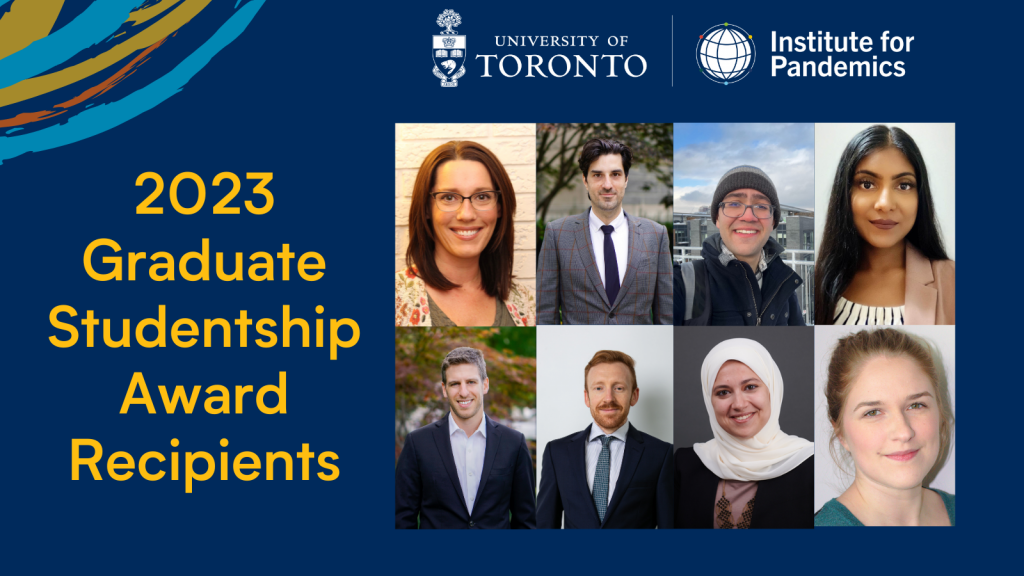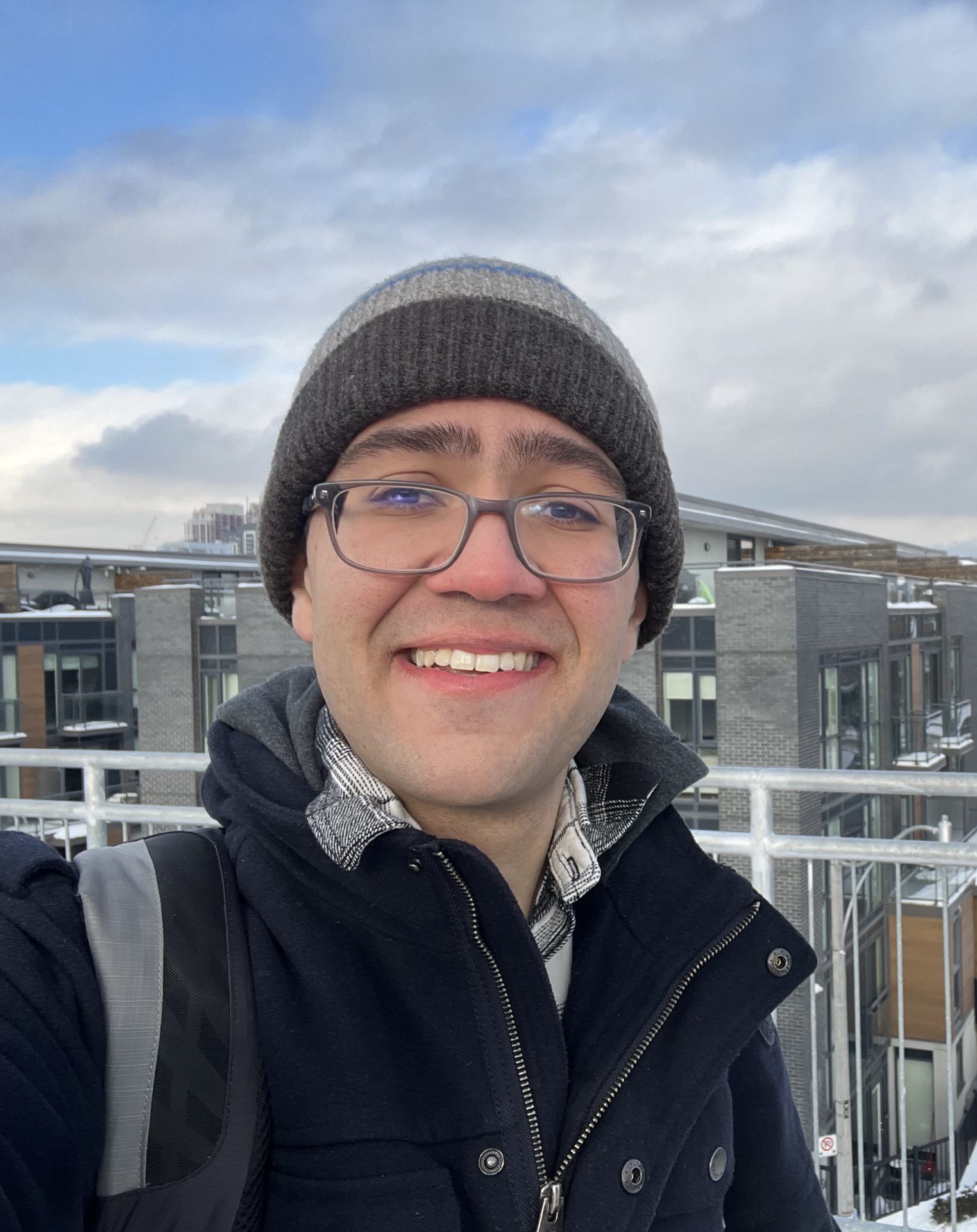2023 Graduate Studentship Award Recipients

The Institute for Pandemics (IfP) is pleased to announce the eight recipients of the 2023 Graduate Studentship Awards.
The purpose of the $10,000 awards is to foster interdisciplinary research training in pandemic readiness, resilience and/or recovery. All awardees work on projects that are co-supervised by faculties from different disciplines. The studentship program provides the opportunity to participate in IfP programming and activities, attend workshops and seminars, present their research at the IfP Symposium, and network with IfP members across divisions and campuses at the University of Toronto.
List of the Graduate Studentship awardees

Supervised by Dionne Aleman, Faculty of Applied Science & Engineering and Laura Rosella, Dalla Lana School of Public Health
Project Title: Empirical Evaluation of Data Re-Balancing Methods for Predicting COVID-19 Spread
Project Summary: Data imbalance is a phenomenon that occurs when one data class (i.e., minority class) occurs significantly less than another (i.e., majority class). Imbalances can occur in any dataset but is a particularly common issue in healthcare data, as instances of disease tend to be rare relative to the general population. This imbalance poses a challenge in Machine Learning (ML) for disease transmission, as the lack of data in the minority class makes it difficult to accurately predict cases of disease.
Numerous data re-balancing methods exist, including random or intelligent re-sampling, or cost-sensitive learning methods. However, most studies investigating the effectiveness of different re-balancing methods use C4.5 decision trees ML models, due to their ease of implementation and interpretation, while few studies have investigated re-balancing methods for other ML model architectures. Therefore, little is known about the efficacy of different re-balancing methods for other common ML models.
Using COVID-19 data generated from the Medical Operations Research Lab's Pandemic Outbreak Planner agent-based simulation, this study aims to provide insight into best practices for handling data imbalance in healthcare data via comparison of different re-balancing methods. These methods will be evaluated based on their ability to improve model accuracy across different ML architectures.

Supervised by Erica Di Ruggiero, Dalla Lana School of Public Health and Nav Persaud, Temerty Faculty of Medicine
Project Title: Intellectual Property Sharing in Crisis: The COVID-19 TRIPS Waiver Dilemma
Project Summary: This study investigates the decision-making processes underlying Canada’s stance on the TRIPS Waiver, a proposal to temporarily suspend intellectual property rights on COVID-19 vaccines, diagnostics, and treatments, to help combat the pandemic. This waiver had the potential to make a significant impact on global vaccine equity. Despite the Waiver’s widespread support by numerous countries and organizations to expedite global access to these tools, Canada did not endorse it. This study seeks to retrospectively explore how Canadian decision-makers arrived at this decision, organized via three overall objectives: (1) Explore how Canadian decision-makers understood and decided on the trade-offs involved in endorsing the TRIPS Waiver; (2) Understand the evidence decision-makers relied on, how it was commissioned, and how this evidence was decided upon; and (3) Examine how various federal actors within and outside the Canadian government mobilized to influence these decisions. These objectives will be achieved via a qualitative research approach, including a comprehensive document review, interviews with policy stakeholders, and an Access to Information and Privacy Act (ATIP) request. The study’s outcomes will be communicated to federal policymakers via a policy report that provides lessons for future IP sharing decision-making during pandemics.

Supervised by Sara Allin, Dalla Lana School of Public Health and Stephan Heblich, Munk School of Global Affairs & Public Policy
Project Title: The costs of healthcare workforce shortages
Project Summary: Workforce shortages are currently a significant constraint on the delivery of safe, high-quality, accessible healthcare services. Health systems internationally were experiencing staffing shortages before 2020, but the pandemic has materially exacerbated this issue. Workforce shortages have grown overall and within specific groups.
This study considers the following research question: What are the costs of workforce shortages since the pandemic began? Two cost categories are considered:
1) Financial and non-financial costs incurred as a result of the current workforce shortages.
2) Expenditures incurred in seeking to prevent and/or mitigate workforce shortages, including initiatives aimed at improving workforce resilience and recovery.
Focusing on the period since 2020, this study seeks to assess the cost of workforce shortages arising due to both the pandemic and wider underlying factors, given the potential difficulty in attributing impacts specifically to the pandemic.
The objectives are:
1) To provide researchers and policymakers with a more in-depth understanding of the full range of costs relating to healthcare workforce shortages, including those pertaining to pandemic resilience and recovery.
2) To provide decisionmakers with a more detailed understanding of costs, to enable higher quality judgments around workforce investments to support future workforce resilience and recovery.

Supervised by Samira Mubareka, Temerty Faculty of Medicine and Venkata R. Duvvuri, Temerty Faculty of Medicine
Project Title: Genomic epidemiology and phylogenomic characterization of viral respiratory pathogens SARS-CoV-2 and Respiratory Syncytial Virus (RSV)
Project Summary: Respiratory diseases caused by viruses can not only place immense strains on healthcare systems but can also spark epidemics, pandemics, and outbreaks. Respiratory viruses such as severe acute respiratory syndrome coronavirus 2 (SARS-CoV-2) and respiratory syncytial virus (RSV) can mutate and develop advantageous features that allow them to spread quicker, become more severe, or surpass host immune systems. As a result, it is important to monitor viral genetic changes and its impacts on disease. Whole genome sequencing (WGS) is a high throughput technique that is used to determine the genetic sequence of viruses, differentiate between subspecies, and identify mutational changes. Our goal is to leverage the power of WGS to address gaps in combined SARS-CoV-2 genomic and clinical determinants of disease, the lack of RSV genomic surveillance in Canada, and viral epidemiological patterns of RSV post COVID-19. Through doing this investigative work, we will also be developing and deploying a WGS reporting workflow that will allow laboratories and public health units to communicate and strengthen their virus surveillance programs, thereby alleviating the strain that surges place on Canada’s healthcare system. This project aligns with IfP’s pillars of readiness and resilience as we will be directly implementing real-time surveillance, advanced modelling methods, and automated tools to support critical laboratory infrastructures.

Supervised by Matthew Osmond, Faculty of Arts & Science and Nicole Mideo, Faculty of Arts & Science
Project Title: Using signatures of recombination in present-day genomes to identify dangerous viral reservoirs and predict pandemic risk
Project Summary: Where will the next pandemic come from? Pandemic readiness requires identifying the reservoirs (e.g., bats, birds, rodents, primates, swine) that are likely to harbor dangerous viruses, and the aspects of their biology that make them so. Mathematical models have been crucial in developing understanding of the ways in which hosts influence the potential of their pathogens to spill over into humans, and sustain human-human transmission. For example, our recent work has shown that certain bat species, due to their exceptionally long lives and ability to tolerate infection, are dangerous in that recombination between pathogen genotypes––which can generate novel combinations of pathogen genes and proteins––is more pronounced than in, e.g., rodents and other reservoir species with short life histories. The aspects of host biology that shape pathogen evolution in the reservoir also leave signatures in present-day genomes. We will use a growing collection of such genomes to predict in which hosts recombination between pathogen genotypes is most frequent, and the reservoir-pathogen pairs that are most dangerous to humans. This work, at the nexus of mathematics, evolutionary epidemiology, and genomics, will offer unique insights for the global surveillance, control, and forecasting of emerging pathogens.

Supervised by Sharmistha Mishra, Temerty Faculty of Medicine and Rafal Kustra, Dalla Lana School of Public Health
Project Title: Limiting biases in measures of vaccine effectiveness from real-world data during evolving outbreaks: a systematic review and simulation study of mpox
Project Summary: Mpox caused a global outbreak in 2022, disproportionately affecting gay, bisexual, and other men who have sex with men. Vaccines were deployed based on historical data suggestive of biological efficacy before data on real-world vaccine effectiveness (VE) was available. Outbreaks rapidly declined, and mathematical models are now being used to quantify the potential role of vaccines in local outbreak control, using estimates from real-world studies. But real-world data may have confounders - e.g., when individuals at high-risk for mpox are more likely to get vaccinated - which could lead to systematic errors in VE measures. I will systematically review data on real-world VE against mpox infection to explore how, and why, VE measures might vary across studies (Aim-1). I will then design a simulation model of an mpox outbreak to explore the influence of potential confounders, like that described above, on VE measures using the simulated data as a proxy for real-world data (Aim-2). Outcomes could guide adjustments to real-world VE, which in turn would help parse the impact that vaccines may have had on recent mpox outbreaks and provide stronger grounding for how much population-level immunity may exist when mpox re-emerges. Thus, this research will support pandemic readiness.

Supervised by Anne-Emanuelle Birn, University of Toronto Scarborough and Bianca Dahl, University of Toronto Scarborough
Project Title: Community activism and COVID-19 policymaking: Social resistance addressing health needs of migrant agricultural workers in Ontario as a bridge across pandemic resilience and recovery
Project Summary: COVID-19 policy responses have been analyzed overwhelmingly in terms of policymaker decisions and actions. Yet throughout the pandemic, community groups and activist researchers – who are typically excluded from formal policymaking – have challenged decisionmakers and mobilized to fill gaps in government responses. Among the most vocal in COVID-19 times are activist researchers who advocate for the health and well-being of migrant agricultural workers. Decades-long resistance efforts to improve the working and living conditions, safety, and well-being of racialized migrants who participate in Canada’s Seasonal Agricultural Worker Program (SAWP) provided impetus and knowhow alike. This study explores political mobilization by and around racialized migrant agricultural workers who experienced the pandemic in disproportionately harmful social, occupational, and health ways. This research asks: What steps have activist groups and researchers taken to address the health needs of migrant agricultural workers in the absence of effective pandemic policymaking? How have community mobilization efforts built on longstanding resistance/resilience efforts to push for policymaking impacts that generate bona fide recovery? Employing a decolonial approach, this study draws on interviews with activists, policymakers, and other key stakeholders involved in COVID-19 responses and actions, contributing to scholarship on pandemic resilience and recovery, policymaking, and social justice mobilization.

Supervised by Lisa Dolovich, Leslie Dan Faculty of Pharmacy and Andrew Pinto, Dalla Lana School of Public Health
Project Title: Virtual Care in Community Pharmacy Services: A Scoping Review and Resulting Recommendations for Practice and Policy
Project Summary: The COVID-19 pandemic showed that virtual care is essential for community pharmacy services when it is not possible to meet patients in person. Virtual care was used more often to make sure patients still got the care they needed while staying safe from COVID-19. Community pharmacists have used virtual care to provide remote pharmacy services for patients, a practice still in use after the critical times of the COVID-19 pandemic. These virtual community pharmacy services can contribute to effectively decrease the burden on other healthcare sectors and increase the quality of patient care. To the best of our knowledge, the use of virtual care in community pharmacy services has not been comprehensively reviewed.
The proposed scoping review aims at mapping the literature and exploring research gaps within the scope of the use of virtual care in community pharmacy services. Additionally, the review will identify the types of virtual care platforms used in the delivery of community pharmacy services and explore their use, barriers, and facilitators during the pandemic. This scoping review can increase pandemic readiness and resilience by identifying opportunities to improve access to healthcare services and maintain continuity of care through virtual care in community pharmacy services.
